| Listing 1 - 7 of 7 |
Sort by
|
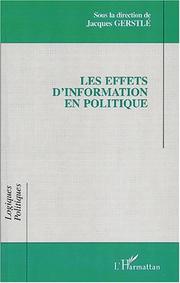
ISBN: 2747506592 9782747506595 Year: 2001 Publisher: Paris L'Harmattan
Abstract | Keywords | Export | Availability | Bookmark
 Loading...
Loading...Choose an application
- Reference Manager
- EndNote
- RefWorks (Direct export to RefWorks)
Information --- Political aspects --- Aspect politique --- 200 Politiek --- 691 Informatiebeleid --- #KVHA:Media --- #KVHA:Communicatie --- #KVHA:Politiek --- Communication in politics --- Political communication --- Press and politics --- Mass media --- Political science --- Communication in politics - France - Congresses
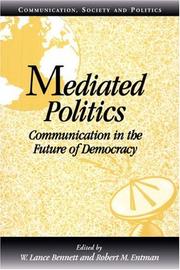
ISBN: 0521789761 0521783569 1316037819 0511613857 Year: 2001 Publisher: Cambridge Cambridge University press
Abstract | Keywords | Export | Availability | Bookmark
 Loading...
Loading...Choose an application
- Reference Manager
- EndNote
- RefWorks (Direct export to RefWorks)
Mediated Politics explores the changing media environments in contemporary democracy: the internet, the decline of network news and the daily newspaper; the growing tendency to treat election campaigns as competing product advertisements; the blurring lines between news, ads, and entertainment. By combining new developments in political communication with core questions about politics and policy, a distinguished roster of international scholars offers new perspectives and directions for further study. Several broad questions emerge from the book: with ever-increasing media outlets creating more specialized segments, what happens to broader issues? Are there implications for a sense of community? Should media give people only what they want, or also what they need to be good citizens? These and other tensions created by the changing nature of political communication are covered in sections on the changing public sphere; shifts in the nature of political communication; the new shape of public opinion; transformations of political campaigns; and alterations in citizens' needs and involvement.
Communication in politics. --- Communication --- Democracy. --- Political aspects. --- #SBIB:309H270 --- Communication in politics --- Democracy --- #SBIB:024.IOS --- #SBIB:324H60 --- Self-government --- Political science --- Equality --- Representative government and representation --- Republics --- Political communication --- Communication and politics --- Politics and communication --- Political aspects --- Politieke communicatie: algemene werken --- Politieke socialisatie --- Mass communications --- Political systems --- Political sociology --- Communication politique --- Démocratie --- Aspect politique --- Social Sciences --- Political Science
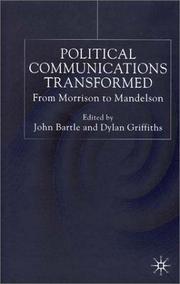
ISBN: 0333776763 Year: 2001 Publisher: Basingstoke Palgrave
Abstract | Keywords | Export | Availability | Bookmark
 Loading...
Loading...Choose an application
- Reference Manager
- EndNote
- RefWorks (Direct export to RefWorks)
Internal politics --- Mass communications --- Great Britain --- Communication in politics --- -Mass media --- -#SBIB:309H271 --- #SBIB:35H500 --- #SBIB:35H6014 --- #SBIB:023.IO --- Mass communication --- Media, Mass --- Media, The --- Communication --- Political communication --- Political science --- Political aspects --- -Politieke communicatie: toepassingsgebieden --- Bestuur en samenleving: algemene werken --- Bestuur en beleid: nationale en regionale studies: Verenigd Koninkrijk --- Politics and government --- -Communication in politics --- Mass media --- -Internal politics --- #SBIB:309H271 --- Politieke communicatie: toepassingsgebieden
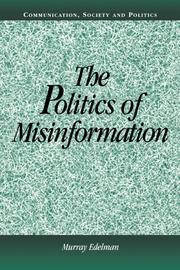
ISBN: 0521805104 0521801176 0511612648 Year: 2001 Publisher: Cambridge Cambridge University press
Abstract | Keywords | Export | Availability | Bookmark
 Loading...
Loading...Choose an application
- Reference Manager
- EndNote
- RefWorks (Direct export to RefWorks)
The Politics of Misinformation is an examination of how concentrations of social and economic power result in public languages of politics that are necessarily image-based, vague, and misleading in their denial of undemocratic tendencies. As a result, public discourses of democracy tend to be populistic, emotional, and likely to emphasize images of progress rather than structural inequalities in their formulations of public problems. Similarly, discourses of policy solutions to public problems emphasize assumptions about rationality in policy processes that are equally poor descriptions of most political outcomes. In short, neither typical problem definitions nor solutions invite critical popular understanding or involvement in democratic politics.
Political sociology --- Communication in politics --- Communication --- -Rhetoric --- -Deception --- Elite (Social sciences) --- #SBIB:021.AANKOOP --- #SBIB:324H50 --- #SBIB:309H270 --- Elites (Social sciences) --- Leadership --- Power (Social sciences) --- Social classes --- Social groups --- Chicanery --- Deceit --- Subterfuge --- Truthfulness and falsehood --- Intrigue --- Language and languages --- Speaking --- Authorship --- Expression --- Style, Literary --- Communication, Primitive --- Mass communication --- Sociology --- Political communication --- Political science --- Political aspects --- Politieke participatie en legitimiteit (referenda, directe democratie, publieke opinie...) --- Politieke communicatie: algemene werken --- Rhetoric --- Communication in politics. --- Deception. --- Political aspects. --- Elite (Social sciences). --- Deception --- Communication and politics --- Politics and communication --- Politics and literature --- Social Sciences --- Political Science
Book
ISBN: 2760521559 1435687051 9781435687059 9782760521551 2760511219 9782760511217 2760511217 Year: 2001 Publisher: Sainte-Foy, Quebec, Canada : Presses de l'Universite du Quebec,
Abstract | Keywords | Export | Availability | Bookmark
 Loading...
Loading...Choose an application
- Reference Manager
- EndNote
- RefWorks (Direct export to RefWorks)
L'auteur analyse et décrit les appareils de communication gouvernementaux des provinces canadiennes et évalue leur performance et leur efficacité sur le terrain en accordant une attention particulière au gouvernement fédéral et à celui du Québec et en les comparant à ceux du Royaume-Uni et de la France.
Communication in politics -- Canada -- History -- 20th century. --- Communication in politics -- Quebec (Province) -- History -- 20th century. --- Government marketing -- Canada -- History -- 20th century. --- Government marketing -- Quebec (Province) -- History -- 20th century. --- Propaganda -- Quebec (Province) -- History -- 20th century. --- Government marketing --- Communication in politics --- Propaganda --- Government - General --- Law, Politics & Government --- Political Institutions & Public Administration - General --- History --- Administration publique --- Communication politique --- Propagande --- Marketing --- Histoire --- Political communication --- Marketing, Government --- Marketing, Public sector --- Public sector marketing --- Political psychology --- Social influence --- Advertising --- Persuasion (Psychology) --- Psychological warfare --- Public relations --- Publicity --- Social pressure --- Political science
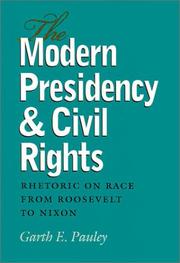
ISBN: 1585449016 1585441074 9781585441075 9781585449019 Year: 2001 Volume: no. 3 Publisher: College Station Texas A & M University Press
Abstract | Keywords | Export | Availability | Bookmark
 Loading...
Loading...Choose an application
- Reference Manager
- EndNote
- RefWorks (Direct export to RefWorks)
"Every President since Franklin Roosevelt has confronted civil rights issues during his tenure in the White House, and most have faced intense demands to speak publicly about the nation's racial problems and possible solutions. Indeed, modern American presidents have become a major focal point for the civil rights struggle." "In The Modern Presidency and Civil Rights, Garth E. Pauley examines modern presidents' communicative and symbolic involvement in these matters, focusing on four crucial speeches, the circumstances surrounding them, and their effect on public attitudes and policy."--Jacket.
Presidents --- Rhetoric --- Political oratory --- Communication in politics --- African Americans --- Political culture --- English language --- African-Americans --- Regions & Countries - Americas --- History & Archaeology --- United States - General --- Afro-Americans --- Black Americans --- Colored people (United States) --- Negroes --- Africans --- Ethnology --- Blacks --- Political communication --- Political science --- Parliamentary oratory --- Political speaking --- Oratory --- Politics, Practical --- Public speaking --- Language and languages --- Speaking --- Authorship --- Expression --- Literary style --- Presidency --- Heads of state --- Executive power --- Racial attitudes of American presidents --- Racial attitudes. --- Language. --- Political aspects --- History --- Civil rights --- Rhetoric. --- Racial attitudes --- Language --- Views on race question --- United States --- Race relations --- Political aspects. --- Politics and government --- Black people --- Germanic languages
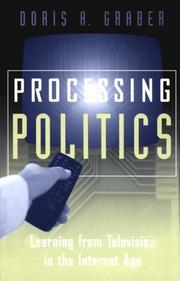
ISBN: 0226305767 0226305759 9780226305769 0226924769 9780226924762 9780226305752 9780226305752 Year: 2001 Publisher: Chicago University of Chicago
Abstract | Keywords | Export | Availability | Bookmark
 Loading...
Loading...Choose an application
- Reference Manager
- EndNote
- RefWorks (Direct export to RefWorks)
How often do we hear that Americans are so ignorant about politics that their civic competence is impaired, and that the media are to blame because they do a dismal job of informing the public? Processing Politics shows that average Americans are far smarter than the critics believe. Integrating a broad range of current research on how people learn (from political science, social psychology, communication, physiology, and artificial intelligence), Doris Graber shows that televised presentations-at their best-actually excel at transmitting information and facilitating learning. She critiques current political offerings in terms of their compatibility with our learning capacities and interests, and she considers the obstacles, both economic and political, that affect the content we receive on the air, on cable, or on the Internet. More and more people rely on information from television and the Internet to make important decisions. Processing Politics offers a sound, well-researched defense of these remarkably versatile media, and challenges us to make them work for us in our democracy.
Mass communications --- Computer architecture. Operating systems --- Political sociology --- United States --- Communication in politics. --- Human information processing. --- Television broadcasting of news --- #SBIB:309H271 --- #SBIB:309H1025 --- #SBIB:309H402 --- Politieke communicatie: toepassingsgebieden --- Mediaboodschappen met een informatieve functie --- Media en publiekgroepen: gebruik van de boodschap, effecten van de media, ... --- Communication in politics --- Human information processing --- Information processing, Human --- Bionics --- Information theory in psychology --- Perception --- Political communication --- Political science --- Media en publiekgroepen: gebruik van de boodschap, effecten van de media, .. --- Media en publiekgroepen: gebruik van de boodschap, effecten van de media, . --- Media en publiekgroepen: gebruik van de boodschap, effecten van de media, --- political, tv, online, digital, contemporary, modern, present day, poli sci, america, american, united states, usa, civic, ignorance, media, information, public, criticism, critics, research, social, psychology, communication, physiology, artificial intelligence, ai, learning, knowledge, cable, defense, democracy, broadcasting, puzzles, problems, brain, audiovisual, gutenberg. --- United States of America
| Listing 1 - 7 of 7 |
Sort by
|

 Search
Search Feedback
Feedback About UniCat
About UniCat  Help
Help News
News